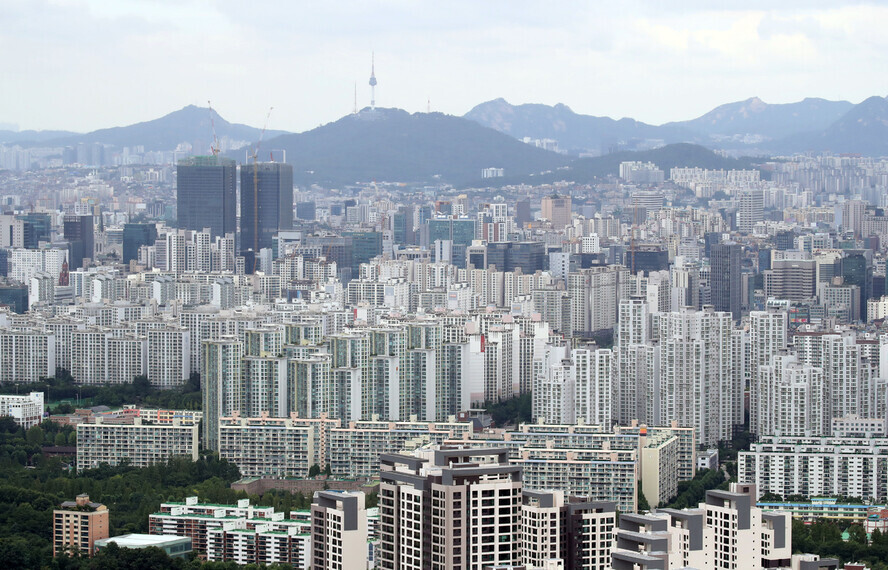hankyoreh
Links to other country sites 다른 나라 사이트 링크
[Reporter’s notebook] Why S. Korea needs a government organization to monitor real estate transactions

The “real estate transaction analysis center” that the administration is currently introducing is being criticized by some as “excessive real estate market intervention without precedent overseas.” But that special organization could be seen as having been put in place because the South Korean real estate market itself is an unusual one without parallels elsewhere in the world.
It is widely known that in contrast with other countries where financial assets make up a large portion of household assets, South Korea has real estate assets accounting for 70-80%. There is one more fact that is less well known, however. An article titled “Study of the Effects of Housing Purchase and Rental Decisions on Household Asset Portfolio Performance” published in the Journal of the Korea Real Estate Analysts Association last March included statistics on the composition of household assets in different countries. Its findings showed that at 39.3%, South Korea’s proportion of residential housing assets was similar to those in Anglophone countries such as the US (40.6%), the UK (34.6%), and Australia (42.5%) -- and actually lower than in fellow East Asian countries Japan (58.8%) and China (73.9%). In contrast, South Korea’s percentage of real estate assets classified as “non-residential housing” -- not actually occupied by its owner -- stood at 30.5%, a rate 10 times higher than in either the US (3.2%) or the UK (2.8%) and many times higher than in Australia (7.9%), Japan (11.4%), or China (7.7%).
“The proportion of residential housing assets is lower than even the 50% presented by domestic and overseas research as an optimal value for residential assets in one’s housing portfolio,” the article noted, adding that the figures “show a very strong perception among South Korean households that real estate constitutes an investment good rather than a consumer good for oneself.”
Higher turnover rate than US, UK, JapanAnother figure illustrating how housing is perceived as an “investment item” rather than a residence in South Korea is the housing transaction turnover rate. Calculated by dividing housing transaction volumes by the housing stock, the turnover rate offers a glimpse at aspects of transactions that simple transaction volumes do not capture. In response to press reports arguing that South Korea had a particularly high transaction tax ratio among OECD members, the administration provided data showing that the South Korean housing transaction turnover rate of 5.5% was higher than in either the US (4.5%) or the UK (3.6%), and 10 times higher than in Japan (0.6%). Figures from the Korea Appraisal Board (KAB) put the 2018 turnover rate for Seoul at 6.1%. An official with the KAB’s market analysis research office explained, “We have institutions not found in other countries that provide capital gains from housing, including the key money system, the real estate resale system, and the collective mortgage loan system.”
South Korea is also the only place where over 60% of all housing consists of apartments -- standardized housing that lends itself easily to sale and purchasing without appraisal values -- and where the media provide ongoing market data about apartments by name, as though providing a product introduction. It is because of these unique aspects of the real estate market environment that a special organization has been established to monitor illegal real estate transactions.
By Jin Myeong-seon, staff reporter
Please direct comments or questions to [english@hani.co.kr]

Editorial・opinion
![[Column] Season 2 of special prosecutor probe may be coming to Korea soon [Column] Season 2 of special prosecutor probe may be coming to Korea soon](https://flexible.img.hani.co.kr/flexible/normal/500/300/imgdb/original/2024/0426/3317141030699447.jpg) [Column] Season 2 of special prosecutor probe may be coming to Korea soon
[Column] Season 2 of special prosecutor probe may be coming to Korea soon![[Column] Park Geun-hye déjà vu in Yoon Suk-yeol [Column] Park Geun-hye déjà vu in Yoon Suk-yeol](https://flexible.img.hani.co.kr/flexible/normal/500/300/imgdb/original/2024/0424/651713945113788.jpg) [Column] Park Geun-hye déjà vu in Yoon Suk-yeol
[Column] Park Geun-hye déjà vu in Yoon Suk-yeol- [Editorial] New weight of N. Korea’s nuclear threats makes dialogue all the more urgent
- [Guest essay] The real reason Korea’s new right wants to dub Rhee a founding father
- [Column] ‘Choson’: Is it time we start referring to N. Korea in its own terms?
- [Editorial] Japan’s rewriting of history with Korea has gone too far
- [Column] The president’s questionable capacity for dialogue
- [Column] Are chaebol firms just pizza pies for families to divvy up as they please?
- [Column] Has Korea, too, crossed the Rubicon on China?
- [Correspondent’s column] In Japan’s alliance with US, echoes of its past alliances with UK
Most viewed articles
- 1‘We must say no’: Seoul defense chief on Korean, USFK involvement in hypothetical Taiwan crisis
- 2Is Japan about to snatch control of Line messenger from Korea’s Naver?
- 3The dream K-drama boyfriend stealing hearts and screens in Japan
- 4Up-and-coming Indonesian group StarBe spills what it learned during K-pop training in Seoul
- 5S. Korea “monitoring developments” after report of secret Chinese police station in Seoul
- 6Division commander ordered troops to enter raging flood waters before Marine died, survivor says
- 7[Column] ‘Choson’: Is it time we start referring to N. Korea in its own terms?
- 8[Editorial] New weight of N. Korea’s nuclear threats makes dialogue all the more urgent
- 9Will NewJeans end up collateral damage in internal feud at K-pop juggernaut Hybe?
- 10‘Weddingflation’ breaks the bank for Korean couples-to-be